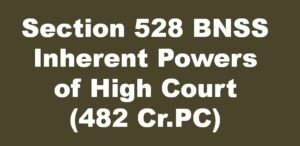528 BNSS | Quashing of FIR & Criminal Proceedings by High Court

528 BNSS
Section 528 BNSS speaks about the inherent powers of High Court wherein High Court can make such orders as may be necessary to secure the ends of justice by preventing abuse of the process of law.
Under this section 528 of BNSS, 2023, a High Court is empowered to quash F.I.R. & criminal proceedings.
Section 528 of BNSS
High Court under section 528 of BNSS can pass necessary order giving effect to any Order under the BNSS or to secure the ends of justice.
Means High Court has inherent power to quash or stay any Order in criminal proceedings.
Petition under Section 528 BNSS
Whenever Police registers an FIR against any person and he feels that the FIR is fake or police is falsely implicating him.
The accused may file petition before High Court directly under section 528 BNSS for challenging the initiation of criminal proceedings.
Quashing of FIR
Generally people ask that at what stage individual can file petition for quashing of FIR?
And where does individual file such petition?
With regard to stage of filing the petition, individual can file such petition immediately after registration of FIR.
He should not wait for investigation or arrest if he has sufficient evidence to believe not guilty for the registered offence.
As per aforesaid contents an accused can file petition before High Court only. Session Court has not jurisdiction to entertain such petition.
Quashing of Criminal Proceedings
Now next question arises that if police has completed the police investigation and filed charge sheet. Has the accused still remedy to file such petition to quash criminal proceedings?
Yes, such petition is still maintainable even after filing of charge sheet. High Court has inherent power to quash the criminal proceedings at any stage to protect unlawful detention and arrest.
Filing of charge sheet will not dilute the power of High Court to exercise its jurisdiction conferred under section 528 BNSS.
Stay on Arrest by High Court
Can High Court pass an Order of stay on arrest while hearing the petition filed under section 528 BNSS?
Yes, High Court can restrain police authorities to take "coercive action” against accused petitioner in pursuant to the FIR or any order passed by the Court below.
“No coercive action” automatically stays on the arrest and even it is like interim anticipatory bail but not anticipatory bail.
Supreme Court Case Laws on 528 BNSS
1. High Court under this inherent power does not act as court of appeal or revision. High Court should not exercise its power to stay legitimate prosecution.
Case Reference: State of AP versus Aravapally Venkanna, AIR 2009 SC 1863
2. Availability of an alternative remedy under revision jurisdiction is not good grounds to maintainability of the petition filed under 528 BNSS.
Case Reference: Puran v Rambilas, (2001) 6 SCC 338
3. It is same remedy as provided under section 151 of Civil Procedure Code, 1908.
Case Reference : CBI v Maninder Singh, (2016) 1 SCC 389
4. The provisions of Articles 226, 227 of the Constitution of India and advance justice and not to frustrate it.
Case Reference: State of Maharashtra v Arun Gulab Gawali, AIR 2010 SC 3762
As per the above case laws, the Hon'ble Supreme Court held that the following kinds of cases wherein High Court can exercise its power:-
(a) Where the First Information Report or the complaint does not disclose prima facie constitute any offence or make out a case against the accused;
(b) Where the allegations in the First Information Report and other materials, if any, accompanying the F.I.R. do not disclose a cognizable offence, justifying an investigation by police officers under Section 175(1) of the BNSS except under an order of a Magistrate within the purview of Section 174(2) of the BNSS, 2023.
(c) Where the uncontroverted allegations made in the FIR or 'complaint and the evidence collected in support of the same do not disclose the commission of any offence and make out a case against the accused.
Conclusion
Conclusively, we can say that the Power of High Court under section 528 of BNSS, 2023 is very wide and High Court can exercise power to quash FIR as well as criminal proceedings.
The following few more examples where High Court can exercise its power to stop the abuse
(a) Where the allegations in the FIR do not constitute a cognizable offence but constitute only a non-cognizable offence, no investigation is permitted by a police officer without an order of a Magistrate as contemplated under Section 174(2) of the BNSS.
(b) Where the allegations made in the FIR or complaint are so absurd and inherently improbable on the basis of which no prudent person can ever reach a just conclusion that there is sufficient ground for proceeding against the accused;
(c) Where there is an express legal bar engrafted in any of the provisions of the BNSS or the concerned Act (under which a criminal proceeding is instituted) to the institution and continuance of the proceedings and/or where there is a specific provision in the Code or the concerned Act, providing efficacious redress for the grievance of the aggrieved party;
(d) Where a criminal proceeding is manifestly attended with mala fide and/or where the proceeding is maliciously instituted with an ulterior motive for wreaking vengeance on the accused and with a view to spite him due to private and personal grudge.
